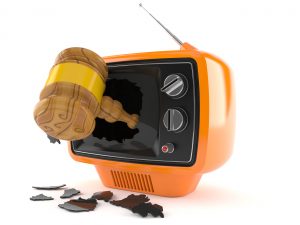Lower The Expectations
Most on-screen dramas do not come close to depicting what litigation is like in real life. Make sure your clients understand this.
 It is important to take regular breaks from the daily routines of work and let your body and mind rest and rejuvenate. Break time is different for everyone. For me, it is a mix of exercise, time in the park with my dogs, and reading a good book. When I need to completely let go of work and give my mind a rest, however, I often fall back on a guilty pleasure: television shows. I cut the cord some time ago and I rely on a few streaming services for my favorite content, most of which are law and order type dramas/police procedurals, both old and new school science fiction, and a bunch of dramatic series of all types. It is much better if I do my television watching alone, however, especially when I am watching any type of courtroom or crime drama. Hopefully my neighbors are not too disturbed when I yell at the television. Usually the outburst is something like, “OBJECT you moron!” or, “No judge would ever allow that.” You get the idea.
It is important to take regular breaks from the daily routines of work and let your body and mind rest and rejuvenate. Break time is different for everyone. For me, it is a mix of exercise, time in the park with my dogs, and reading a good book. When I need to completely let go of work and give my mind a rest, however, I often fall back on a guilty pleasure: television shows. I cut the cord some time ago and I rely on a few streaming services for my favorite content, most of which are law and order type dramas/police procedurals, both old and new school science fiction, and a bunch of dramatic series of all types. It is much better if I do my television watching alone, however, especially when I am watching any type of courtroom or crime drama. Hopefully my neighbors are not too disturbed when I yell at the television. Usually the outburst is something like, “OBJECT you moron!” or, “No judge would ever allow that.” You get the idea.
Most television dramas make a mess of courtroom and police procedure. Jury selection and cross examinations on screen are the absolute worst. I suppose I should not watch shows about the legal profession, but despite the silly fictional portrayals of lawyers and what they do, many of the storylines are interesting and fun to watch. At the end of the day, I am just a regular person who enjoys a good story like many other people. Unfortunately, my clients and potential clients who watch these shows often come to me with unrealistic expectations about what will happen with their case, and more importantly, what I can do, what the law allows and what actually happens in a real courtroom. My challenge is to lower their expectations from what they see on television.
Anyone who has never before experienced litigation, been a witness at a deposition or trial, or party to a negotiation can be misled by what happens on the television screen. For example, a number of television shows depict the jury selection process with the lawyers from each side asking potential jurors all types of questions that would not be allowed and the jurors providing responses in front of all the other potential jurors that are sure to taint the rest of the jury pool. The lawyers on these shows always seem to have access to unlimited amounts of background information about each potential juror, even though the process happens in one quick television day. The best part about jury selection on the television screen is that the lawyers get to dramatically dismiss the potential jurors they don’t want right after they question them, in front of all of the other jurors, and before the other side ever says a word. In the real world, jury selection is more complicated, particularly in criminal cases and federal district courts where the process is supervised by a judge. There are rules about what the lawyers can ask the jurors, each side gets a turn, there is very little drama and the lawyers exercise their jury challenges outside the presence of the panel of potential jurors. Also, unless you are paying for a very expensive jury consultant and the process takes days, it is unlikely that you will know any more about your potential jurors than what they filled out on their jury selection questionnaires that morning or what they say when you ask them questions during voir dire. There are never really any “Columbo” or “Perry Mason” moments during jury selection, though most television dramas that depict the process make it seem like that is the only way to win a case.

Legal AI: 3 Steps Law Firms Should Take Now
Many on-screen dramas also have scenes about witnesses on the stand, the dramatic cross examinations and spontaneous confessions. There are a few movies that get this right. What trial attorney who has been practicing for 25 years or less has not seen “My Cousin Vinny” at least a few times? I also have to admit that I love “A Few Good Men.” The typical television show these days, however, routinely depicts lawyers at trial making long monologue speeches with a witness on the stand, while guiding them through direct testimony or during cross examination. In a crime drama, there is almost always a sudden spontaneous confession by a witness who just cannot take the tongue lashing from the lawyer questioning them. Then there is my favorite, the lawyer who makes an argument to the jury about the significance of a witness’s answer with the witness still on the stand. None of this is typical, the performances that the TV attorneys give would result in a sustained objection and the magical confessions just do not happen.
Many legal and crime dramas also have scenes where the suspect is immediately identified from a video by “facial recognition” software in a matter or minutes, or a teeny bit of DNA is found on a firearm or other murder weapon. Search warrants are really easy to get on television. The big bad businesses on television turn over just the right documents (buried among boxes of discovery) when ordered to do so and there is always a smoking gun document. Depositions are always videotaped on television shows no matter how large or small the case. Television juries always come back with a huge monetary award for the underdog winner. If you litigate where the drama is set, you will probably notice that they almost always use the wrong buildings to represent the courthouses.
The reality is that much of what happens in any courtroom and during any litigation is much more mundane, subject to many rules, and nothing like what you see on your television screen. Most cases do not even go to trial. Even when they do, there are months, and sometimes years of court conferences, document discovery exchanges, depositions, and motion practice before a trial happens. There are rarely any “gotcha” moments at the typical trial. That “smoking gun” document does not exist. In the real world, the litigator’s client hates to hear that their case may take a long time to resolve, that they may never have their day at trial to “tell their story,” or that the proof they need to win the day will probably not appear when the adversary turns over that magic email during discovery. Like it or not, it is important that your clients understand these things, especially when they come to you with visions of the last episode “Bull,” “The Good Fight,” “Scandal,” “FBI,” “Law and Order, ” “NCIS,” “Criminal Minds,” or any other legal-themed television show (the list is endless) that they watched the night before their meeting with you. You must lower their expectations and continue to manage those expectations through the entire process. If you do not, you will undoubtedly have an unhappy client that may make demands that you cannot meet.
Although some may disagree, in my opinion, litigation is never really boring. It is unpredictable and often entertaining. Most litigators, especially trial attorneys, have dozens of stories that they love to tell. Most on-screen dramas, however, do not come close to depicting what litigation is like in real life. Make sure your clients understand this. Let them know that you will fight for them, but it won’t be like that television show they saw last night. Lower the expectations and if that magic email that wins your case actually does appear, you will be a rockstar.
Sponsored

Legal AI: 3 Steps Law Firms Should Take Now

Navigating Financial Success by Avoiding Common Pitfalls and Maximizing Firm Performance

Is The Future Of Law Distributed? Lessons From The Tech Adoption Curve

The Business Case For AI At Your Law Firm

 Christine A. Rodriguez is of counsel to the firm Balestriere Fariello and successfully represents individuals and small businesses in all manner of employment discrimination, civil rights, criminal defense, civil litigation and commercial litigation matters. She also advises small businesses on all aspects of legal matters from contract to employee issues. You can reach her by email at christine. a. rodriguez@balestrierefariello. com.
Christine A. Rodriguez is of counsel to the firm Balestriere Fariello and successfully represents individuals and small businesses in all manner of employment discrimination, civil rights, criminal defense, civil litigation and commercial litigation matters. She also advises small businesses on all aspects of legal matters from contract to employee issues. You can reach her by email at christine. a. rodriguez@balestrierefariello. com.
Sponsored

The Business Case For AI At Your Law Firm









